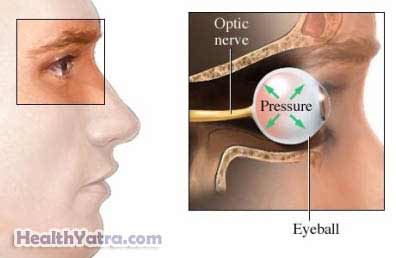Definition
Glaucoma describes a group of eye disorders that causes damage to the optic nerve. This degenerative eye disease is one of the leading causes of chronic blindness in the US.
Open-angle glaucoma is the most common form of glaucoma in the United States. Within the eye, fluid is made and then drained from the eye. If either the fluid is made too quickly (not common) or drains too slowly, then the pressure of the eye can increase, leading to damage to the optic nerve.
This damage to the optic nerve can lead to a decrease in peripheral vision and may eventually cause blindness.
Open-angle glaucoma can often be controlled well with proper treatment, and most patients who receive treatment will maintain their vision.

Causes
The exact cause of open-angle glaucoma is unknown. However, factors that play a role in causing the disease include:
- Older age—Aging may cause the aqueous humor to drain or be absorbed less efficiently.
Risk Factors
A risk factor is something that increases your chance of getting a disease or condition. The following factors increase your chance of developing open-angle glaucoma:
- Family history of glaucoma
- Glaucoma in one eye—This increases the risk of developing glaucoma in the other eye.
- Increased intraocular pressure (pressure inside the eye)
- Ethnic background—African Americans and Hispanics are at a greater risk of glaucoma.
- Diabetes
- Injury to the eye
- Certain eye abnormalities (eg, congenital defects)
Symptoms
Many patients with open-angle glaucoma experience few or no symptoms until the disease has progressed to the very late stages. Other symptoms may include:
- Loss of peripheral vision
- Tunnel vision
- Blindness
Diagnosis
Your doctor will ask about your symptoms and medical history, and perform a physical exam.
Tests may include the following:
- Eye exam with pupil dilation
- Tonometry —a test to determine intraocular pressure
- Visual field test to determine vision loss
- Slit lamp examination
- Photographs of the optic nerve
- Examining the outflow channels of the angle (gonioscopy)
- Analysis of the nerve fiber layer around the optic nerve
Treatment
The goal of treatment is to reduce intraocular pressure. Talk with your doctor about the best treatment plan for you. Treatment options include:
- Medications—Eye drops, and rarely pills, are often administered to reduce intraocular pressure.
- Laser treatment—Laser treatment may be used to reduce intraocular pressure in some people.
- Surgery—Surgery may be done to open a new outflow channel from the eye.
Prevention
Open-angle glaucoma cannot be prevented, but treatment can reduce the risk of vision loss. To help reduce your chance of vision loss caused by open-angle glaucoma, proper treatment of the condition is necessary. Since most people don’t have any symptoms of having glaucoma, regular eye examinations are extremely important, as early diagnosis and treatment can help prevent vision loss.
